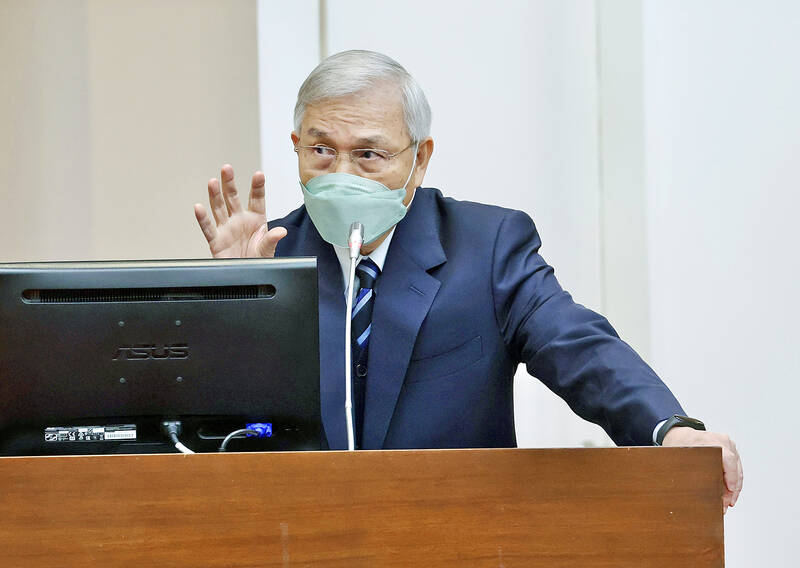The central bank last year sought to stabilize the local currency with a net sale of US$13 billion amid massive fund outflows that weakened the New Taiwan dollar by 9.83 percent against the greenback, central bank Governor Yang Chin-long (楊金龍) said.
The interventions were necessary, as foreign portfolio managers aggressively cut holdings in local shares by NT$1.14 trillion (US$37.4 billion) to meet asset redeployment and fund redemption demand induced by the US Federal Reserve’s interest rate hikes to tame inflation, he said in a report released ahead of a meeting of the Legislative Yuan’s Finance Committee on Wednesday next week.
US bond yields spiked and stock prices tumbled amid monetary tightening, the report said.

Photo: CNA
As a result, US tech shares took a hard hit and the TAIEX fared similarly, as many firms are involved in the global supply chains of US technology titans, it said.
Foreign funds realized capital gains and wired profit abroad, augmenting demand for the US dollar, it said.
The central bank had to step in to maintain the local foreign exchange market’s stability by selling US dollars valued at NT$8.25 billion in the first half and US$4.75 billion in the second half of last year, Yang said.
The foreign exchange interventions last year totaled about 1.7 percent of GDP, falling short of a 2 percent threshold the US Department of the Treasury uses as one of three criteria to judge whether trade partners engage in currency manipulation to gain unfair trade advantages.
The other two gauges are a trade surplus of at least US$20 billion with the US, and a current account surplus exceeding 2 percent of GDP.
Depreciation pressure on the NT dollar has mitigated this year, as foreign funds seemed to have regained an interest in local shares in lieu of a net purchase of US$8.2 billion as of Wednesday, Yang said, adding that the local currency increased 0.67 percent versus the greenback.
Yang had a dovish reading of inflation data after the consumer price index (CPI) last month increased by 3.04 percent and core CPI excluding volatile items advanced 2.98 percent.
The CPI could rise 1.94 percent this year, with analysts anticipating an increase of 1.4 percent to 2.6 percent, he said.

CHIP WAR: Tariffs on Taiwanese chips would prompt companies to move their factories, but not necessarily to the US, unleashing a ‘global cross-sector tariff war’ US President Donald Trump would “shoot himself in the foot” if he follows through on his recent pledge to impose higher tariffs on Taiwanese and other foreign semiconductors entering the US, analysts said. Trump’s plans to raise tariffs on chips manufactured in Taiwan to as high as 100 percent would backfire, macroeconomist Henry Wu (吳嘉隆) said. He would “shoot himself in the foot,” Wu said on Saturday, as such economic measures would lead Taiwanese chip suppliers to pass on additional costs to their US clients and consumers, and ultimately cause another wave of inflation. Trump has claimed that Taiwan took up to

A start-up in Mexico is trying to help get a handle on one coastal city’s plastic waste problem by converting it into gasoline, diesel and other fuels. With less than 10 percent of the world’s plastics being recycled, Petgas’ idea is that rather than letting discarded plastic become waste, it can become productive again as fuel. Petgas developed a machine in the port city of Boca del Rio that uses pyrolysis, a thermodynamic process that heats plastics in the absence of oxygen, breaking it down to produce gasoline, diesel, kerosene, paraffin and coke. Petgas chief technology officer Carlos Parraguirre Diaz said that in

SUPPORT: The government said it would help firms deal with supply disruptions, after Trump signed orders imposing tariffs of 25 percent on imports from Canada and Mexico The government pledged to help companies with operations in Mexico, such as iPhone assembler Hon Hai Precision Industry Co (鴻海精密), also known as Foxconn Technology Group (富士康科技集團), shift production lines and investment if needed to deal with higher US tariffs. The Ministry of Economic Affairs yesterday announced measures to help local firms cope with the US tariff increases on Canada, Mexico, China and other potential areas. The ministry said that it would establish an investment and trade service center in the US to help Taiwanese firms assess the investment environment in different US states, plan supply chain relocation strategies and

Japan intends to closely monitor the impact on its currency of US President Donald Trump’s new tariffs and is worried about the international fallout from the trade imposts, Japanese Minister of Finance Katsunobu Kato said. “We need to carefully see how the exchange rate and other factors will be affected and what form US monetary policy will take in the future,” Kato said yesterday in an interview with Fuji Television. Japan is very concerned about how the tariffs might impact the global economy, he added. Kato spoke as nations and firms brace for potential repercussions after Trump unleashed the first salvo of